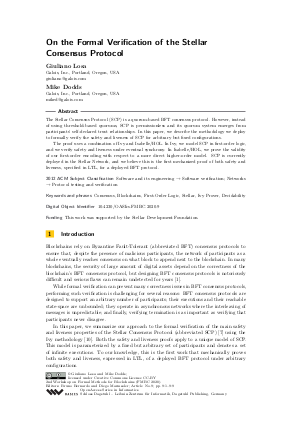On the Formal Verification of the Stellar Consensus Protocol
Authors Giuliano Losa, Mike Dodds
-
Part of:
Volume:
2nd Workshop on Formal Methods for Blockchains (FMBC 2020)
Part of: Series: Open Access Series in Informatics (OASIcs)
Part of: Conference: Workshop on Formal Methods for Blockchains (FMBC) - License:
 Creative Commons Attribution 3.0 Unported license
Creative Commons Attribution 3.0 Unported license
- Publication Date: 2020-12-11
File

PDF
OASIcs.FMBC.2020.9.pdf
- Filesize: 397 kB
- 9 pages
Document Identifiers
Subject Classification
ACM Subject Classification
- Software and its engineering → Software verification
- Networks → Protocol testing and verification
Keywords
- Consensus
- Blockchains
- First-Order Logic
- Stellar
- Ivy Prover
- Decidability
Metrics
- Access Statistics
-
Total Accesses (updated on a weekly basis)
0Document
0Metadata
Abstract
The Stellar Consensus Protocol (SCP) is a quorum-based BFT consensus protocol. However, instead of using threshold-based quorums, SCP is permissionless and its quorum system emerges from participants’ self-declared trust relationships. In this paper, we describe the methodology we deploy to formally verify the safety and liveness of SCP for arbitrary but fixed configurations. The proof uses a combination of Ivy and Isabelle/HOL. In Ivy, we model SCP in first-order logic, and we verify safety and liveness under eventual synchrony. In Isabelle/HOL, we prove the validity of our first-order encoding with respect to a more direct higher-order model. SCP is currently deployed in the Stellar Network, and we believe this is the first mechanized proof of both safety and liveness, specified in LTL, for a deployed BFT protocol.
Cite As Get BibTex
Giuliano Losa and Mike Dodds. On the Formal Verification of the Stellar Consensus Protocol. In 2nd Workshop on Formal Methods for Blockchains (FMBC 2020). Open Access Series in Informatics (OASIcs), Volume 84, pp. 9:1-9:9, Schloss Dagstuhl – Leibniz-Zentrum für Informatik (2020)
https://doi.org/10.4230/OASIcs.FMBC.2020.9
BibTex
@InProceedings{losa_et_al:OASIcs.FMBC.2020.9,
author = {Losa, Giuliano and Dodds, Mike},
title = {{On the Formal Verification of the Stellar Consensus Protocol}},
booktitle = {2nd Workshop on Formal Methods for Blockchains (FMBC 2020)},
pages = {9:1--9:9},
series = {Open Access Series in Informatics (OASIcs)},
ISBN = {978-3-95977-169-6},
ISSN = {2190-6807},
year = {2020},
volume = {84},
editor = {Bernardo, Bruno and Marmsoler, Diego},
publisher = {Schloss Dagstuhl -- Leibniz-Zentrum f{\"u}r Informatik},
address = {Dagstuhl, Germany},
URL = {https://drops.dagstuhl.de/entities/document/10.4230/OASIcs.FMBC.2020.9},
URN = {urn:nbn:de:0030-drops-134226},
doi = {10.4230/OASIcs.FMBC.2020.9},
annote = {Keywords: Consensus, Blockchains, First-Order Logic, Stellar, Ivy Prover, Decidability}
}
Author Details
Funding
This work was supported by the Stellar Development Foundation.
References
-
Ittai Abraham, Guy Gueta, Dahlia Malkhi, Lorenzo Alvisi, Rama Kotla, and Jean-Philippe Martin. Revisiting fast practical byzantine fault tolerance. arXiv preprint arXiv:1712.01367, 2017.

-
Musab A Alturki, Jing Chen, Victor Luchangco, Brandon Moore, Karl Palmskog, Lucas Peña, and Grigore Roşu. Towards a verified model of the algorand consensus protocol in coq. arXiv preprint arXiv:1907.05523, 2019.

-
Idan Berkovits, Marijana Lazić, Giuliano Losa, Oded Padon, and Sharon Shoham. Verification of Threshold-Based Distributed Algorithms by Decomposition to Decidable Logics. In Isil Dillig and Serdar Tasiran, editors, Computer Aided Verification, Lecture Notes in Computer Science, pages 245-266, Cham, 2019. Springer International Publishing.

-
Cynthia Dwork, Nancy Lynch, and Larry Stockmeyer. Consensus in the presence of partial synchrony. Journal of the ACM (JACM), 35(2):288-323, 1988.

-
Yeting Ge and Leonardo De Moura. Complete instantiation for quantified formulas in satisfiabiliby modulo theories. In Computer Aided Verification, pages 306-320. Springer, 2009.

-
Chris Hawblitzel, Jon Howell, Manos Kapritsos, Jacob R. Lorch, Bryan Parno, Michael L. Roberts, Srinath Setty, and Brian Zill. IronFleet: Proving Practical Distributed Systems Correct. In Proceedings of the 25th Symposium on Operating Systems Principles, SOSP '15, pages 1-17, New York, NY, USA, 2015. ACM.

-
Marta Lokhava, Giuliano Losa, David Mazières, Graydon Hoare, Nicolas Barry, Eli Gafni, Jonathan Jove, Rafał Malinowsky, and Jed McCaleb. Fast and secure global payments with Stellar. In Proceedings of the 27th ACM Symposium on Operating Systems Principles, SOSP '19, pages 80-96, New York, NY, USA, October 2019. Association for Computing Machinery.

- Giuliano Losa. https://github.com/stellar/scp-proofs, 2019.
-
Giuliano Losa, Eli Gafni, and David Mazières. Stellar Consensus by Instantiation. In Jukka Suomela, editor, 33rd International Symposium on Distributed Computing (DISC 2019), volume 146 of Leibniz International Proceedings in Informatics (LIPIcs), pages 27:1-27:15, Dagstuhl, Germany, 2019. Schloss Dagstuhlendash Leibniz-Zentrum fuer Informatik.

-
Kenneth L. McMillan and Oded Padon. Deductive verification in decidable fragments with Ivy. In International Static Analysis Symposium, pages 43-55. Springer, 2018.

-
Ryuya Nakamura, Takayuki Jimba, and Dominik Harz. Refinement and Verification of CBC Casper. In 2019 Crypto Valley Conference on Blockchain Technology (CVCBT), pages 26-38, June 2019.

-
Oded Padon, Jochen Hoenicke, Giuliano Losa, Andreas Podelski, Mooly Sagiv, and Sharon Shoham. Reducing Liveness to Safety in First-Order Logic. In 45th ACM SIGPLAN Symposium on Principles of Programming Languages (POPL 2018), Los Angeles, 2018.

-
Oded Padon, Jochen Hoenicke, Kenneth L. McMillan, Andreas Podelski, Mooly Sagiv, and Sharon Shoham. Temporal prophecy for proving temporal properties of infinite-state systems. In 2018 Formal Methods in Computer Aided Design (FMCAD), pages 1-11. IEEE, 2018.

-
Oded Padon, Giuliano Losa, Mooly Sagiv, and Sharon Shoham. Paxos Made EPR: Decidable Reasoning About Distributed Protocols. Proc. ACM Program. Lang., 1(OOPSLA):108:1-108:31, October 2017.

- Karl Palmskog, Milos Gligoric, Brandon Moore, Lucas Peña, and Grigore Roşu. Verification of Casper in the Coq Proof Assistant, 2018. URL: http://hdl.handle.net/2142/102075.
-
Vincent Rahli, Ivana Vukotic, Marcus Völp, and Paulo Esteves-Verissimo. Velisarios: Byzantine Fault-Tolerant Protocols Powered by Coq. In Amal Ahmed, editor, Programming Languages and Systems, Lecture Notes in Computer Science, pages 619-650, Cham, 2018 . Springer International Publishing.

-
Marcelo Taube, Giuliano Losa, Kenneth L. McMillan, Oded Padon, Mooly Sagiv, Sharon Shoham, James R. Wilcox, and Doug Woos. Modularity for decidability of deductive verification with applications to distributed systems. In Proceedings of the 39th ACM SIGPLAN Conference on Programming Language Design and Implementation, PLDI 2018, pages 662-677, New York, NY, USA, June 2018. Association for Computing Machinery.

